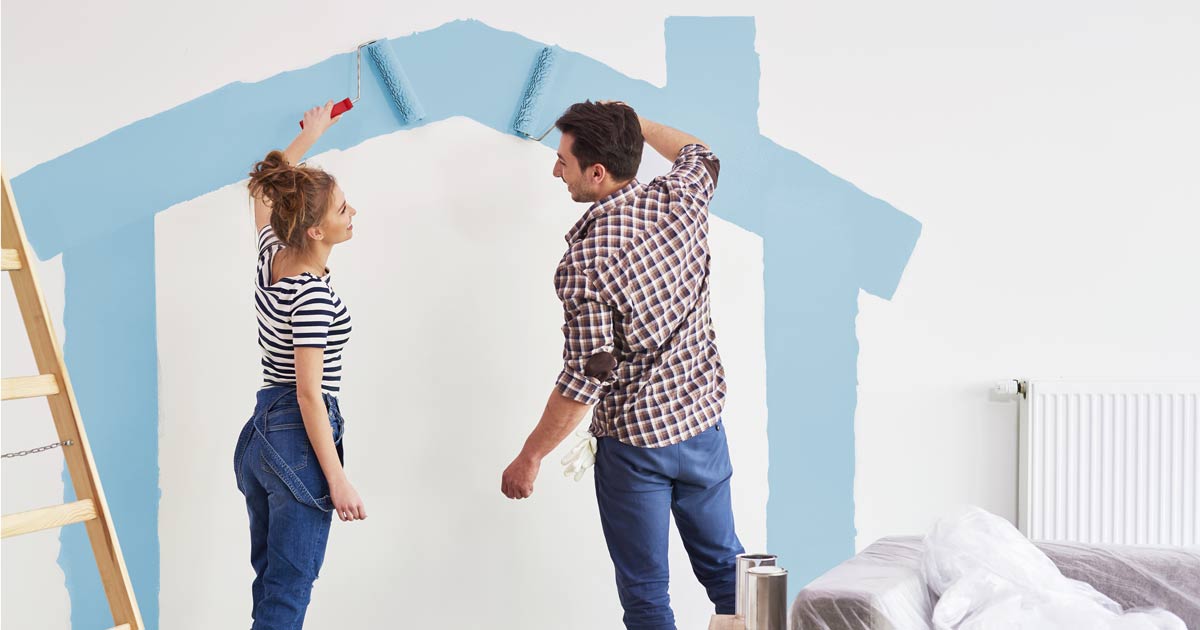Homeowners always have a lot of questions about home painting. Just about every other day someone comes to me with a question about paint brands, brushes, sprayers, materials and more. I noticed that there are also a lot of companies out there who offer pre-fabricated painting kits, but they’re all different and it’s hard to decide which one is worth the money. That’s why I designed this blog post: to give you the information you need to make an informed decision when it comes to home painting!
Table of Contents
-Steps for Painting a House
If you’re planning to paint your house, there are a few things you need to do beforehand to ensure the job is done right. Here are some steps to follow:
- Choose the right paint: The type of paint you use will depend on the surface you’re painting and the look you want to achieve. For example, if you’re painting walls, you’ll need a different type of paint than if you’re painting trim or cabinets.
- Prepare the surface: Before painting, it’s important to properly prep the surface. This includes cleaning it and making any necessary repairs.
- Protect your surfaces: Once the surface is prepped, it’s time to protect anything that shouldn’t be painted. This includes covering up outlets, removing switch plates, and taping off baseboards and trim.
- Prime the surface: Once everything is protected, you can start priming the surfaces that will be painted. This helps the paint adhere better and creates a more even finish.
- Paint: Now it’s time for the fun part – Painters near me! Be sure to start with an even coat and work your way up or down depending on what type of paint you’re using (i.e., latex or oil-based).
- Clean up: After painting, be sure to clean all your supplies and put everything away. You don’t want dried paint ruining your nice new finish!
-What Tools Will You Need?
You will need a few supplies before you start painting your house. These include a ladder, paintbrushes, drop cloths, and painter’s tape. You may also need a power washer to clean the surface before you start painting.
A ladder is necessary to reach any high areas that need to be painted. Paintbrushes come in various sizes and shapes, so choose the ones that fit your needs best. Drop cloths protect surfaces from paint drips and scratches. Painter’s tape helps you create clean lines and prevents paint from bleeding onto surfaces that you don’t want painted.
If the surface of your house is dirty, you may need to use a power washer to clean it before painting. Otherwise, the paint may not adhere properly or look its best. Make sure to follow the manufacturer’s instructions when using a power washer.
-How To Choose the Right Paint Colors
When it comes to painting your house, there are a lot of factors to consider. But one of the most important is choosing the right paint colors. The right colors can make all the difference in how your home looks and feels. Here are a few tips on how to choose the right paint colors:
- Consider the mood you want to create. Paint colors can affect the mood of a room. For example, lighter colors tend to be more airy and open, while darker colors can make a space feel cozy and intimate. Think about the overall atmosphere you want to create in your home, and choose paint colors that will help achieve that.
- Take into account the existing color scheme. If you’re not starting from scratch with your paint job, then you’ll need to take into account the existing color scheme of your home. This will help you choose complementary or contrasting paint colors that will still look good together.
- Use samples! Never buy paint without first trying out samples on your walls. The way a color looks in the store can be very different from how it looks in your actual home. so always test out potential paint colors before making a purchase.
- Get inspired by nature. If you’re having trouble choosing paint colors, one great way to get inspired is by looking to nature for inspiration. Look at photos of landscapes or other natural scenes and find colors that you love. Then, try to find paints that match those hues
-Common Mistakes When Painting Your House
When painting your house, there are a few common mistakes that you might make. Here are some of the most common mistakes when painting your house:
- Not Preparing the Surface
One of the most common mistakes when painting your house is not preparing the surface properly. This includes not sanding down the surface to create a smooth finish and not cleaning the surface beforehand. If you don’t prepare the surface properly, the paint will not adhere correctly and will likely peel off eventually.
- Not Using Primer
Another mistake that people make when painting their house is not using primer. Primer helps to create a smooth base for the paint to adhere to and also helps to cover up any imperfections in the surface. Without primer, your paint job will likely be uneven and will not last as long.
- Applying Too Much Paint
If you apply too much paint to the surface, it will take longer to dry and may end up looking lumpy or uneven. It’s important to apply just enough paint so that you have an even coverage without any thick layers.
- Not Letting Paint Dry Completely Between Coats
If you don’t let each coat of paint dry completely before adding another, they will start to interact with each other and can create an uneven finish. It’s important to wait until each coat is completely dry before adding another one on top.
-Where to Start Painting Your House?
If you’re planning on painting your house, congratulations! A fresh coat of paint can do wonders for any space. But before you start painting, there are a few things you should do to prepare. In this section, we’ll go over where to start painting your house so that the process is as smooth as possible.
- Choose Your Paint Color
The first step is to decide what color you want to paint your house. This may seem like a no-brainer, but it’s important to take some time to think about what shade will best suit your home. If you’re not sure where to start, consider looking at Pinterest or design magazines for inspiration. Once you’ve settled on a color, it’s time to head to the store and purchase your paint.
- Prep Your Space
Before you start painting, it’s important to prep your space. This means taking the time to remove all furniture from the room (or at least move it to the center), cover flooring with drop cloths, and fill any holes or cracks in the walls with spackle. Prepping your space will help ensure that the paint job is clean and professional-looking.
- Paint!
Now comes the fun part: painting! When painting, be sure to use even strokes and avoid getting paint on surfaces that you don’t want painted (like windows or baseboards). If possible, try to work in sections so that wet paint doesn’t have
-Making Sure the Surface is Dry
If you want the paint to adhere well and look its best, you must make sure the surface is dry before painting. If it’s wet, the paint will not adhere properly and will likely peel or crack.
You can use a variety of methods to ensure the surface is dry before painting, such as:
-Using a hair dryer on a low setting
-Wiping down the surface with a clean, dry cloth
-Using a fan to circulate air around the area
-Allowing the surface to air dry completely
Whichever method you choose, just make sure the surface is completely dry before moving on to painting.
-Tips on Improving the Look of Your Home After Painting
If you’re like most people, you probably don’t enjoy painting your house. It’s a lot of work and it can be difficult to get the results you want. But, if you take the time to do it right, painting your house can be a great way to improve its appearance. Here are some tips on how to improve the look of your home after painting:
- Choose the right color: This is probably the most important step in painting your house. The color you choose will set the tone for the entire room, so make sure you pick something you love. If you’re not sure what color to choose, ask for help from a professional painter or someone at your local hardware store.
- Prepare the surface: Once you’ve chosen your color, it’s time to prep the surface you’ll be painting. This includes repairing any cracks or holes in the wall and making sure the surface is clean and free of dust. If you don’t prep the surface properly, your paint job will likely suffer as a result.
- Use quality materials: When it comes to paint, quality matters. Cheaper paints may save you money upfront, but they won’t look as good or last as long as higher-quality paints. So, it’s worth spending a little extra on quality paint and supplies.
- Follow directions: Be sure to read all instructions carefully before beginning your project. This will help ensure that you get the best results possible












Ebony ride dildo 2
November 26, 2022Hi there, all iss going sound here andd ofcourse every one iis
sharing information, that’s acrually good, keep uup writing.